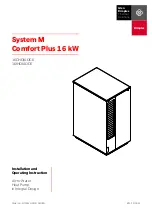
7
refrigerants when using charging equipment. Hoses or lines must be as short as
possible to reduce the quantity of refrigerant contained therein.
-
Cylinders must be kept in an appropriate position, in accordance with the
instructions.
-
Check that the cooling system is grounded before charging the system with
refrigerant.
-
Label the system once charging is complete (if this is not already the case).
-
Pay close attention to not overfilling the cooling system.
•
Before recharging the system, carry out a pressure test using a suitable purge gas.
The system must be examined to make sure there are no leaks after the charging
operation and before commissioning. A follow-up leak test must be carried out
before leaving the site.
Dismantling
•
Before dismantling, the technician must familiarise himself/herself with the
equipment and its specifications. We highly recommend carefully recovering all
refrigerants. Before this, oil and refrigerant samples must be taken if analyses are
to be carried out before any other use of the recovered refrigerant. Check for the
presence of a power supply before starting work.
1. Familiarise yourself with the equipment and how it operates.
2.
Electrically isolate the system.
3. Before starting work, check the following points:
-
mechanical handling equipment is available if needed to handle the refrigerant
cylinders;
-
all personal protective equipment is available and used correctly;
-
the recovery process is followed at all times by a cognizant person;
-
the recovery cylinders and equipment comply with the relevant standards.
4.
Drain the cooling system where possible.
5. If a vacuum cannot be created, install a manifold in order to be able to remove
the refrigerant from various locations within the system.
6.
Make sure that the cylinder is located on the scales before starting recovery
operations.
7. Start the recovery unit and operate as per its instructions.
8.
Do not overfill the cylinders (no more than 80% of the volume must be filled with
liquid).
9.
Do not exceed the maximum working pressure of the cylinder, even temporarily.
10. When the cylinders have been filled correctly and the process is complete, check
that the cylinders and the equipment are quickly removed from the site and that
the alternative shut-off valves on the equipment are closed.
11. The recovered refrigerant must not be charged in another cooling system, unless
it has been cleaned and inspected.
TROUBLESHOOTING
•
All brazing must be carried out by qualified brazers.
•
Replacement pipes must always be made of copper in compliance with standard
NF EN 12735-1.
•
Leak detection; pressure test:
-
never use oxygen or dry air, risk of fire or explosion,
EN
Summary of Contents for PX50 MD12
Page 2: ......
Page 27: ...25 4 3 I Wiring diagrams 25 4 3 1 PX50 MD3 MD4 MD5 MD6 MD7 EN...
Page 28: ...26 4 3 2 PX50 MD9...
Page 29: ...27 4 3 3 PX50 MD11 MD12 EN...
Page 30: ...28 4 3 4 PX50 TD11 TD12...
Page 34: ......
Page 35: ......










































